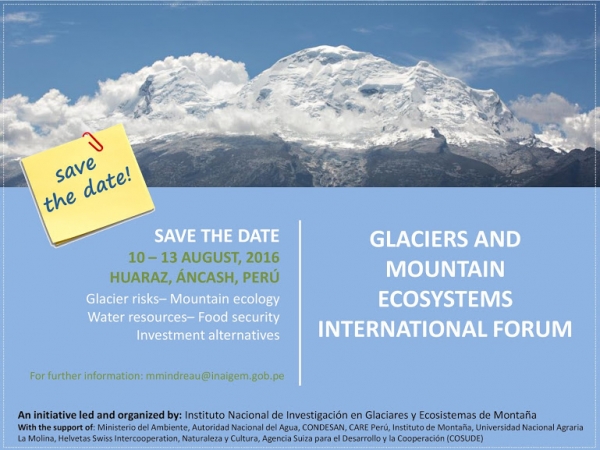International Glacier and Mountain Ecosystems Forum
Monday, 18 April, 2016 - 08:49

The largest chain of tropical mountains in the world, comprising thirty peaks higher than 6000 meters above sea level, is the Cordillera Blanca; located in Ancash, Peru. In 1975, the Huascaran National Park was created, covering the entirety of this Cordillera over 4000 m.a.s.l. This area was later declared as a World Heritage Site by UNESCO because of its unique characteristics, and is also the core of the Huascaran Biosphere Reserve.
However, Peru has lost more than 40% of its glaciers (ANA, 2014) and is considered the third most vulnerable country to climate change worldwide.
The loss of these water reserves is worrying as more than 50% of the population is concentrated in the arid Peruvian coast, which only has access to 1.8% of the country's water resources and therefore it depends on water that comes from the mountains. To this is added the fact that 49% of electricity, used by the nation, comes from hydroelectric plants (MINEM, 2014). It is also important to consider that there is population growth and therefore increased energy and water needs.
Another important consequence of climate change, largely affecting the Peruvian Andes and other mountain parts of the world, is the increased risk of disasters by avalanches, landslides, mudslides and alluvium, among others; and food insecurity of their populations. These consequences are added to the loss and fragmentation of its highly endemic and biodiverse ecosystems, but extremely fragile, due to unsustainable human interventions; reducing the provision of environmental services, deepening poverty, conflicts, and therefore the vulnerability of their populations.
Research on these issues are disperse at the national level. There is also a need to increase research because they are new problems continually being identified, which require more in-depth studies.
It is in this context that the "National Research Institute in Glaciers and Mountain Ecosystems" (INAIGEM) arises, aiming to promote and expand scientific and technological research in the field of glaciers and mountain ecosystems, promoting sustainable management for the benefit of people living in or benefiting from these ecosystems.
It is expected that, based on the research of glaciers and mountain ecosystems carried out so far (and research agendas identified and unidentified), public institutions, private companies and authorities make informed and coordinated decisions.
It is in this sense that the INAIGEM leads the organization, with the support of organizations with extensive experience in the above issues, the "International Glacier and Mountain Ecosystems Forum", which aims to exchange experiences and knowledge about glaciers and mountain ecosystems, promoting opportunities for cooperation between public institutions, civil society, business and academia to the application of research to the sustainable development of mountain populations.
The International Glacier and Mountain Ecosystems Forum will be held in the city of Huaraz, Peru from the 10th to 13th of August 2016.
Work regions:
Mountain Ranges:
Location Country:
Peru
Files:

Facebook comments